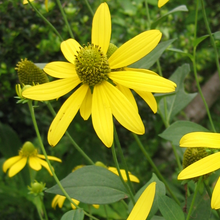Rudbeckia laciniata, commonly known as cutleaf coneflower, is a tall native perennial with deeply lobed green leaves and large yellow flowers featuring drooping petals and green cones.
Height & Spread: 48 - 72 in x 24 - 36 in
Bloom Time: Midsummer to early fall
Light Requirements: Full sun to part shade
Soil Preference: Moist, fertile soil; thrives in rich loam or clay
Watering Needs: Moderate to high; prefers consistent moisture
Deer Resistance: Some resistance; young growth may be browsed
Native Status
Native to eastern and central North America - commonly found in floodplains, open woodlands, and along streambanks.
WILDLIFE & INSECTS
Butterflies
- Supports nectar feeding by swallowtails, skippers, and other mid to late summer butterflies.
Birds
- Seed heads are visited by goldfinches and other small birds in fall and winter.
Spacing & Landscape Use
Spacing Recommendations
- Space 24 - 36 in apart to accommodate vigorous height and spreading form.
Landscape Placement
- Well suited for rain gardens, streamside plantings, tall borders, and wildlife gardens where moisture is available.
Companion Plants
- Joe Pye Weed (Eutrochium fistulosum) - Matches habitat needs and attracts pollinators throughout summer.
- Verbena hastata (Blue Vervain) - Adds vertical purple spikes that contrast with Rudbeckia’s golden blooms.
- Sanguisorba canadensis (Canadian Burnet) - Offers a fine, airy texture and white flower spikes in moist sites.
- Carex vulpinoidea (Fox Sedge) - Provides dense, moisture loving ground cover beneath Rudbeckia.
- Asclepias incarnata (Swamp Milkweed) - Extends pollinator interest in wetland habitats and meadows.



